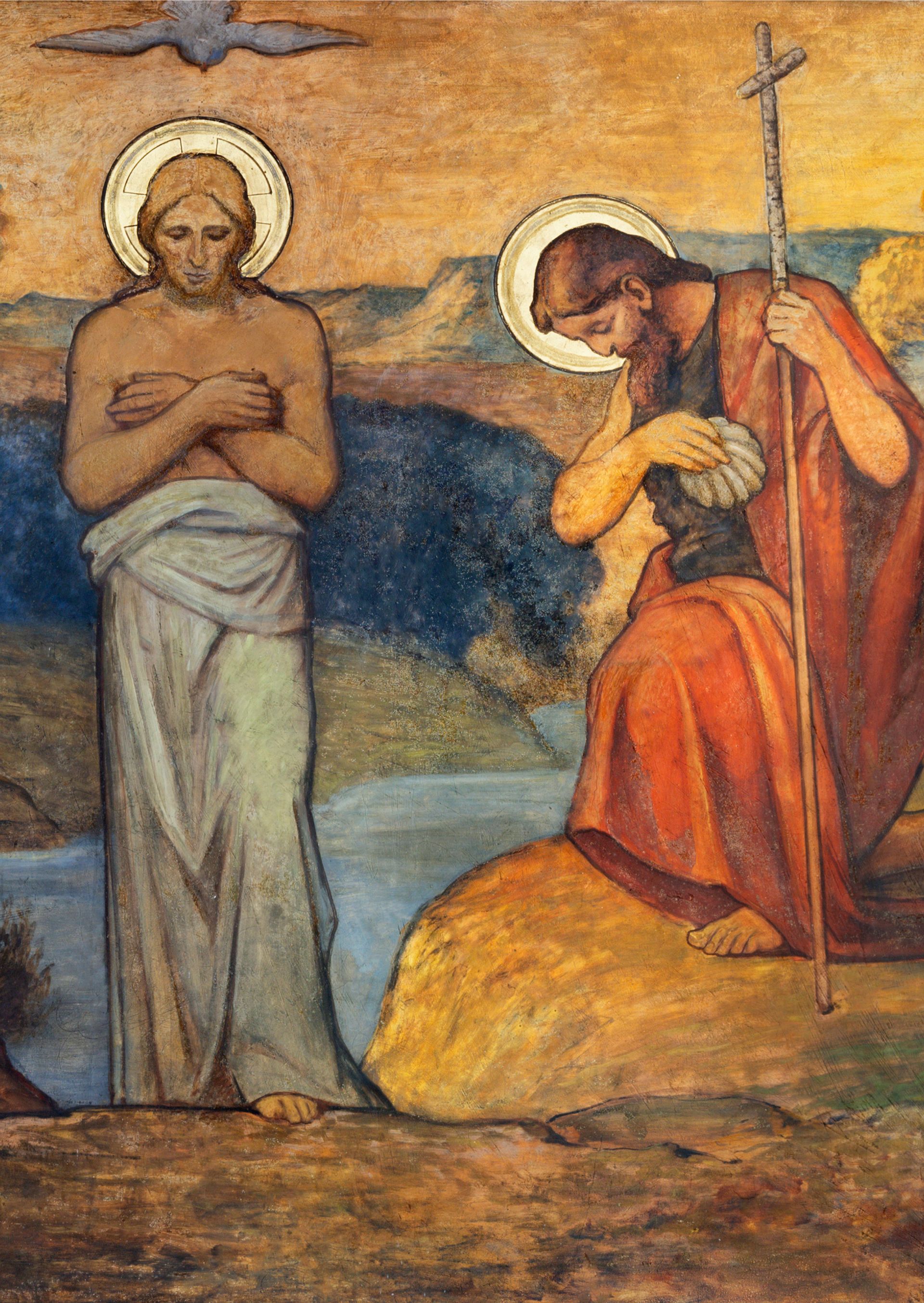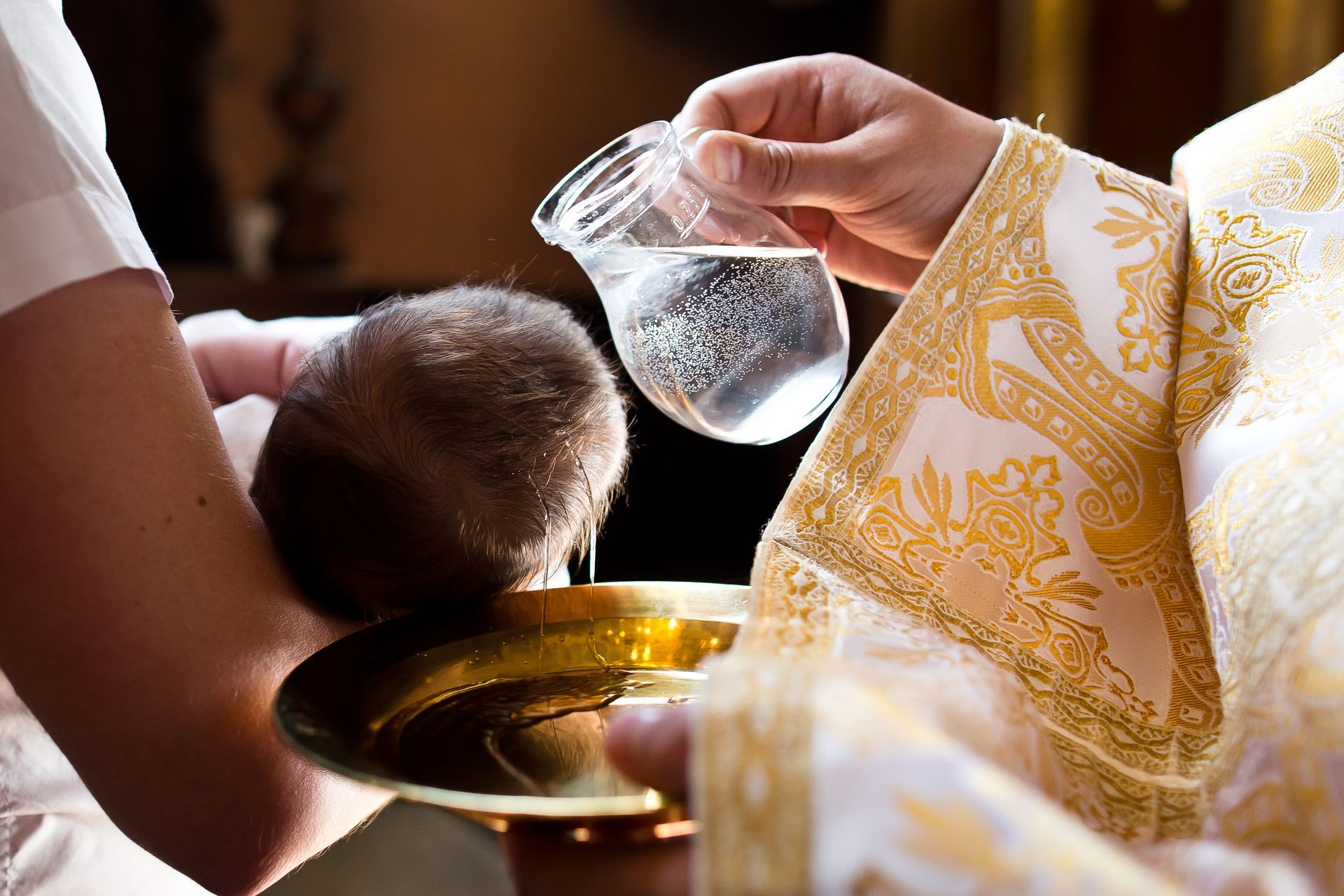Baptism
" Amen, amen, I say to you, no one can enter the kingdom of God
without being born of water and Spirit."
( John 3:5)
What is the Significance of the Sacrament of Baptism?
Christ instituted the Sacrament of Baptism as an essential act for our salvation (cf. John 3:5). Its waters cleanse us of all guilt associated with sin—both Original Sin and actual sin—fill us with grace, and make us children of God. We also become members of the Mystical Body of Christ, the Church, giving us a share in the Kingdom of God. (Cf. Catechism of the Catholic Church, nos. 1987, 2813)
"Go, therefore, and make disciples of all nations, baptizing them in the name of the Father, and of the Son, and of the holy Spirit."
Matthew 28:19
Peter [said] to [the multitude], "Repent and be baptized, every one of you, in the name of Jesus Christ for the forgiveness of your sins; and you will receive the gift of the holy Spirit."
Acts of the Apostles 2:38
A bishop, priest, or deacon normally confers Baptism, but anyone can baptize in an emergency by pouring water over the recipient's head, while praying, "I baptize you in the name of the Father, and of the Son, and of the Holy Spirit." For this reason, the Church teaches that "Baptism is the sacrament of regeneration through water in the word" (Roman Catechism, II, 2, 5; cf. Council of Florence: DS 1314; CIC 204§l; 849; CCEO 675 §1). (Cf. CCC 232-233, 694,1256, 1278)
Holy Baptism is the basis of the whole Christian life, the gateway to life in the Spirit (vitae spiritualis ianua), and the door which gives access to the other sacraments. Through Baptism we are freed from sin and reborn as sons of God; we become members of Christ, are incorporated into the Church and made sharers in her mission.
(The Catechism of the Catholic Church, paragraph 1213)
Are you unaware that we who were baptized into Christ Jesus were baptized into his death? We were indeed buried with him through baptism into death, so that, just as Christ was raised from the dead by the glory of the Father, we too might live in newness of life.
Romans 6:3-4
Infant Baptism Registration
If you are a parishioner of Saint Michael and wish to have your child baptized, please complete the Baptism Registration form.
If you are not parishioner of Saint Michael and wish to have your child baptized, please complete the New Parishioner Registration form.
Baptism for Adults
The Order of Christian Initiation of Adults, or OCIA, is a communal process for formal initiation of new members into the Catholic Church. This process is a return to the formation of the earliest members of the Church in the first and second centuries.
Baptism is birth into the new life in Christ. In accordance with the Lord’s will, it is necessary for salvation, as is the Church herself, which we enter by Baptism.
-Catechism of the Catholic Church
What is the Necessity of Baptism?
The Lord himself affirms that Baptism is necessary for salvation. He also commands his disciples to proclaim the Gospel to all nations and to baptize them. Baptism is necessary for salvation for those to whom the Gospel has been proclaimed and who have had the possibility of asking for this sacrament.
The Church does not know of any means other than Baptism that assures entry into eternal beatitude; this is why she takes care not to neglect the mission she has received from the Lord to see that all who can be baptized are "reborn of water and the Spirit." God has bound salvation to the sacrament of Baptism, but he himself is not bound by his sacraments.
Dying and Rising with Christ through Baptism
“No one can enter the Kingdom of God without being born of water and Spirit.”
(John 3:5)
With this statement and His ministry, Jesus taught that Baptism was necessary for salvation.
After his Resurrection, Jesus met with the eleven Apostles and gave them the commission to preach the Gospel and baptize, telling them...
The word baptism in its origins is Greek and means "immersion" and "bath".
Immersion in water is a sign of death, and emersion out of the water means new life.
To bathe in water is also to undergo cleansing. Saint Paul sums up this truth when he says...
“You were buried with him in baptism, in which you were also raised with him through faith in the power of God, who raised him from the dead.”
The origin and foundation of Christian Baptism is Jesus. Before starting his public ministry, Jesus submitted himself to the baptism given by John the Baptist. The waters did not purify him; he cleansed the waters. “He comes to sanctify the Jordan for our sake...to begin a new creation through the Spirit and water” (from Saint Gregory Nazianzen, Liturgy of the Hours, I, 634).
Jesus’ immersion in the water is a sign for all human beings of the need to die to themselves to do God’s will. Jesus did not need to be baptized because he was totally faithful to the will of his Father and free from sin. However, he wanted to show his solidarity with human beings in order to reconcile them to the Father.
By commanding his disciples to baptize all nations, he established the means by which people would die to sin—Original and actual—and begin to live a new life with God.
-United States Catholic Catechism for Adults
What are the effects of Baptism?
- By Baptism all sins are forgiven, Original Sin and all personal sins, and temporal punishment due to sin is removed. After one has been reborn in Christ, there is nothing to prevent one’s entry into God’s Kingdom. However, though all sins are removed, there remains, as an effect of Original Sin, the inclination to sin that is called concupiscence. This inclination to sin shows itself in what is sometimes referred to as a darkening of the mind and a weakening of the will, that is, the inability to know clearly the right or wrong of an action and/or the lack of strength to resist temptation and always to do the right thing no matter how hard this is. The effects of Original Sin need not harm us so long as we seek strength to resist them through theSacrament of Penance, the Sacrament of the Eucharist, prayer, a deepening spirituality, growth in virtue, and a wholehearted dependence on God.
- Baptism also gives us new life as adopted children of God. We become sharers of divine life and temples of the Holy Spirit. We are now made righteous by God and live in a state of grace, that is, we live in union with God because of his gracious and loving initiative. Our permanence in the state of grace is called sanctifying grace because God “sanctifies” us, that is, makes us his holy people by giving us his life. God continues to assist us by many helps that are called actual graces. Thus, we have the ability to live and act under the guidance and light of the gifts of the Holy Spirit. This helps us mature in goodness through the practice of virtues, such as the Cardinal Virtues: prudence, justice, temperance, and fortitude.
- By Baptism we become members of the Church, the Body of Christ. We share in the priesthood of Christ as well as his prophetic and royal mission. “You are a chosen race, a royal priesthood, a holy nation, a people of his own, so that you may announce the praises’ of him who called you out of darkness into his marvelous light” (1 Peter 2:9). We enjoy the community we find in the Church, share our talents and gifts with its members, respond willingly to its teachings and requirements, and assume the responsibilities that our membership implies.
- Baptism provides a common foundation among all Christians, including those not yet in full communion with the Catholic Church. The Church recognizes the validity of Baptism in other Christian Churches as long as the rite involved the pouring of or immersion in water, a Trinitarian formula, and the intention to baptize. Those who have been baptized have been saved by their faith in Christ and the grace of Baptism. “They therefore have a right to be called Christians and with good reason are accepted as brothers [and sisters] by the children of the Catholic Church” (Catechism of the Catholic Church, paragraph 1271, citing UR, no. 3).
- “Incorporated into Christ by Baptism, the person baptized is configured to Christ. Baptism seals the Christian with the indelible spiritual mark (character) of his belonging to Christ. No sin can erase this mark, even if sin prevents Baptism from bearing the fruits of salvation. Given once for all Baptism cannot be repeated” (Catechism of the Catholic Church, no. 1272). This spiritual mark is also called a character, which Saint Augustine likened to distinctive brandings impressed upon soldiers and slaves during Roman times to signify the commander or owner to whom they belonged. Baptism marks us permanently as belonging to Christ, whose image we bear.
BAPTISM REGISTRATION
Baptism is birth into the new life in Christ. To register your infant child for Baptism... SELECT HERE









